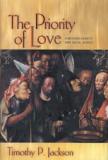Agape, First and Foremost
In the introduction to Utilitarianism (1861), John Stuart Mill remarks that ethics, unlike science, must always revert to first principles. If we are to argue coherently in favor of some course of action in personal or social life, we must appeal to a basic principle or set of principles justifying the position. For Mill, this principle was the advancement of personal or social happiness, that is, the increase of pleasure and the decrease of pain. He justifies this principle on the basis of common sense: happiness is, after all, what everyone wants. Timothy P. Jackson accepts the need for principles in moral reasoning, but he claims that the dominant value for the Christian must be strong agape, self-giving love, and that all the appropriate principles will cohere with this value.
Jackson, who is associate professor of Christian ethics at The Candler School of Theology at Emory University in Atlanta, Ga., finds three basic features in agape on our level: (1) unconditional willing of the good for the other, (2) equal regard for the well-being of the other, and (3) passionate service open to self-sacrifice. We must say on our level, because human agape supposes that God has first loved us in creation, in Israel, in Jesus. The adjective strong attached to agape implies that agapic love is a metavalue, that virtue without which one has no access to other goods, either moral or non-moral. The priority of agape does not mean that it is the only value, nor does it, as Anders Nygren argued in his 1930’s Agape and Eros, rule out eros in the sense of self-fulfilling love. In fact, much of the first substantive chapter, Christlike Love and Reciprocal Justice, goes to locating the other virtues, especially justice, with respect to love and to figuring out how love can be self-giving without being self-destructive.
After a chapter on the relationship between divine love and divine justice, Jackson devotes the remainder of his book to three areas of personal perplexity and social controversy: war, punishment and abortion. One might expect the advocate of unconditional willing of the good for the other to be an opponent of just war positions and most forms of retributive justice. But the positions here are more nuanced. Under the heading Christian Love and Political Violence, Jackson tries to answer two questions: How, if at all, may agape combat unjustifiable forms of violence, especially political violence? Does agape itself ever act violently?
His response is a qualified defense of just war theory. Love promotes the well-being of others, but there are times when it seems impossible to do so without exercising violence against those who themselves are causing great harm to other people. Then the significance of love is that it will guide the nature, degree and goal of the counterviolence. Similarly, although forgiveness, the cessation of againstness, is a requirement of Christian love, this forgiveness is compatible with demanding earthly retribution in the case of crimes against persons and communities. Punishment is often love’s taking justice seriously.
The most interesting chapter for me is the final one, Abortion and the Ethic of Care. Jackson argues against an approach to the abortion question, to life questions in general, solely on the basis of the interest-based rights of self-conscious agents. We do not begin life as self-conscious agents, and we do not manage to get through even adult life as self-conscious agents at all times. We rely on one another for care in order ever to have interest-based rights, and the priority of love means giving that care to the other, even when that other comes into our lives as a burden or a surprise.
Although Jackson takes individual human life to begin with conception, he thinks that an especially strong case can be made for recognizing personhood at 10 to 12 weeks with the development of heartbeat and measurable brain function. At this stage the fetus can receive and respond to personal care. The author would work politically to eliminate elective abortions, with the qualifier elective allowing for abortions in some grave situations, after the first trimester. The solution is likely to please neither pro-choice nor pro-life people, but the argument from care offers a helpful way of negotiating the debate.
Jackson is a first-rate scholar who writes clearly and gracefully. Any summary of his argument in Priority of Love can hardly do justice to the facility with which he handles the controversies on each of his major themes and to his provocative subthemes. Can God will not to be? Can we speak rightly of forgiving God? Can love be separated from reward for the lover? Can the prospect of life after death become an obstacle to love?
My main complaint is that in this book Jackson never lays out the groundwork for the priority of love, as he does in his earlier book Love Disconsoled: Meditations on Christian Charity (1999) with its opening analysis of the place of strong agape in the Bible. The Cartesian in me says that one must always start in philosophy and theology with clear beginnings and move step by step forward and that those beginnings can never be claimed once and for all.
A related difficulty is that I found myself wondering if Jackson really needs the theological base in addressing the problems of violence, forgiveness and abortion, since he conducts the arguments mostly on a philosophical level. John Kavanagh, S.J., takes up similar themes, often with more radical conclusions, in Who Count as Persons? Human Identity and the Ethics of Killing (2001), without ever leaving the level of non-theological personalism. But I may now be asking Jackson to write a different book, when he has already written an excellent one.
This article also appeared in print, under the headline “Agape, First and Foremost,” in the September 1, 2003, issue.








